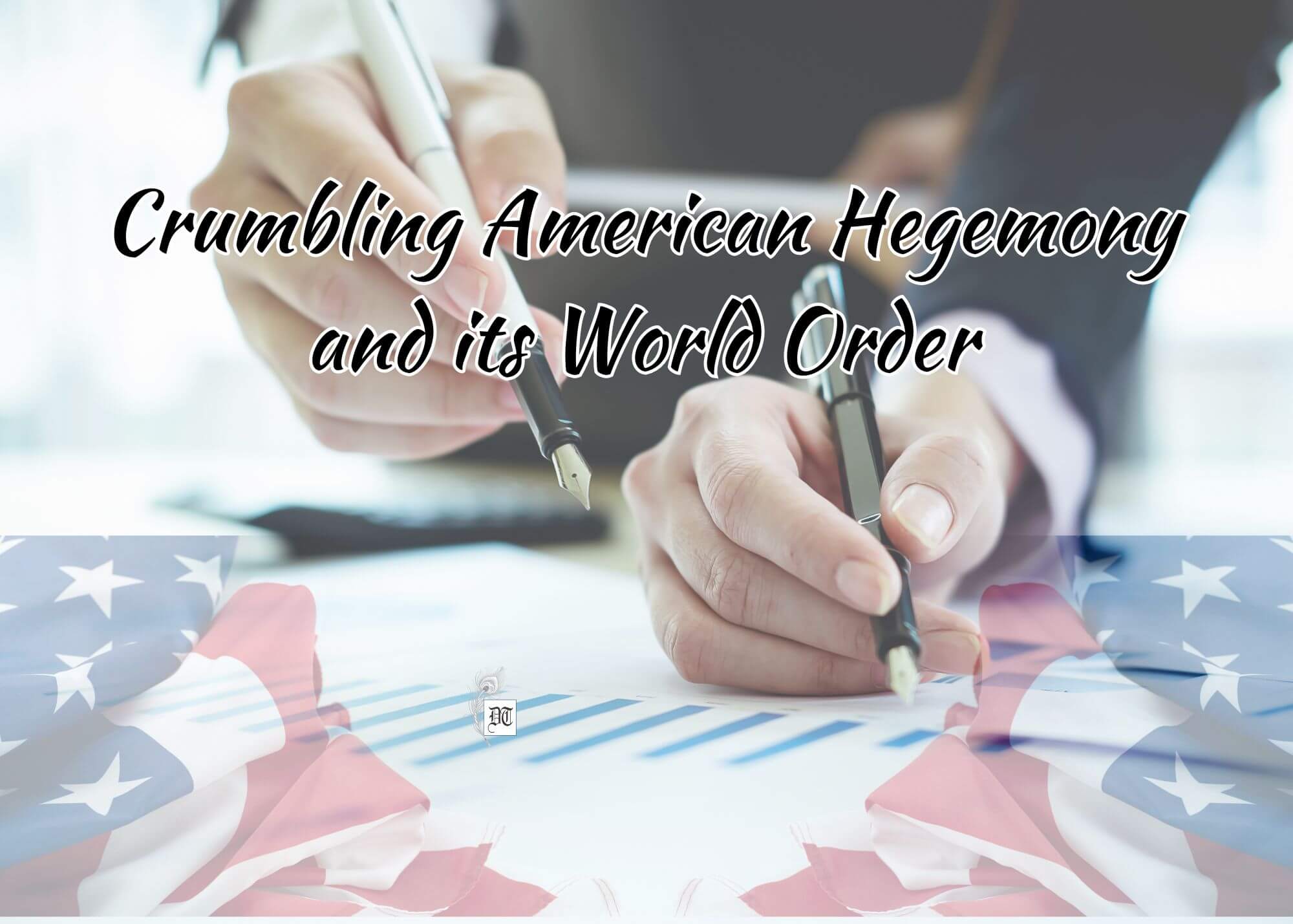Dr Baljeet discusses the transition from a unipolar to a multipolar world, highlighting the US’s growing challenges and domestic and foreign backlash affecting global power dynamics and international relations, exclusively for Different Truths.
When the Second World War ended in 1945, the United States of America began to carve out its way to reach the pinnacle of power and become the strongest country in the world. While the war devastated the economies of all other countries, surprisingly, that of the United States not only survived but also emerged as the largest of all. Rapid industrialization, a housing boom, less unemployment, and an increase in wages were some potent factors that made it the strongest one. Not only did the United States emerge as the strongest economic and military power, but it also assisted the Western countries financially through the Marshall Plan to win over them Furthermore, for the security of all its allies and to halt the expansion of communism, the United States was instrumental in the creation of NATO in 1949. The only challenge then it faced to be the superpower was from the USSR, a communist country. The Cold War ensued between the two for supremacy and ended with the USSR’s disintegration in 1991. After that, there was none to challenge its writ across the world.
In the world’s top financial institutions—the International Monetary Fund (IMF) and World Bank, the United States is the biggest shareholder and, therefore, can dictate its terms to any country needing financial aid. Being the sole superpower of the world, it claims to be the champion of democracy. In the two epic wars, the United States participated as an upholder of democratic institutions against the authoritarian forces. It played a significant role in the establishment of the United Nations Organisation to maintain peace and cooperation among the nations. The dollar has been recognised as the most powerful world currency.
But in the last decade or so, a reaction against American hegemony over the world seems to have set in. The world order structured by the superpower seems to be crumbling, as the unfolding of events suggests. First of all, its actions both at home and abroad disprove its claims to be a supporter of democratic institutions and a defender of human rights. To the world at large, the United States boasts of diversity as its strength, but the ground reality is something else. The minorities—African American, Hispanic, Asian, and the rest—are discriminated based on caste, colour and creed. Despite the Civil Rights Act of 1964 that abolishes racism, and the two executive orders signed by the incumbent president Joe Biden, advancing racial equity, this inherent evil of racial discrimination in the American social milieu exists though not much explicitly but implicitly. Minorities, particularly, Black people, are discriminated against when it comes to securing good income, employment, wealth, housing, etc. Three years ago, the death of African American man George Floyd in Minneapolis at the hands of a white police officer during Donald Trump’s presidency, triggered the ‘Black Lives Matter’ movement that spread to Europe and other countries. These massive protests by people all over the world exposed American hypocrisy of being custodian and protector of human rights. Recently, when the students and faculty members of various American universities and colleges protested peacefully against Israel’s excesses on Palestinians and urged the United States not to support the former in its brutal actions, a reign of terror was let loose on them.
In its foreign policy too, the United States has shown wanton disregard for human rights. Thousands of men, women and children are being butchered; hospitals, schools and shelter houses are under attack in Gaza; but the US, instead of helping the sufferers, is, ironically, siding with the perpetrators of the heinous crimes. Unfortunately, the United States has vetoed most United Nations resolutions for a ceasefire and humanitarian aid in Gaza with the least amount of human contact. All these acts on the part of the superpower have drawn worldwide condemnation. Way back in 2003, its unwarranted interference in Iraq purportedly to punish its president Saddam Hussein for possessing chemical weapons also proved hollow as its only objective was to gain control of oil supplies. In 2011, when the ‘Arab Spring’ movement for democratic regimes swept in most of the countries in West Asia, the United States’ role as protector of democratic rights became well known to all. To get rid of the brutal Taliban regime and restore democracy, it ruled over Afghanistan for twenty years and then left the Afghans, in 2021, abruptly to their fate to suffer again. The Superpower role in West Asia, by aligning with President Benjamin Netanyahu of Israel, who has been accused of committing crimes of unprecedented scale against the Palestinians, speaks volumes about its duplicity of being a votary of democracy. In the garb of protecting Ukrainians, the United States, with its NATO allies, is flexing its powerful muscles to show the world that it has to toe its line of action.
China has recently challenged the United States’ dominance in the economic, technological, and political spheres. The latter has pulled up its sleeves to drag down America from the pinnacle. Since China has become the second largest economy and the world markets are flooded with its goods of various kinds. Its rapidly flourishing trade has become worrisome for the United States. To curtail it, the latter has banned and sanctioned many Chinese products and multinational companies, including Huawei, to trade in the USA. China is also an influential member of the BRICS, an association of Brazil, Russia, India, China and South Africa to counter Western dominance. Similarly, China’s Belt and Road Initiative is also an eyesore for the United States. It develops new markets for Chinese goods and strengthens its relations with partner countries. Even the United States dollar dominance has also come under threat as Russia, India, Bangladesh and some Gulf countries are planning to trade among themselves in local currencies. Besides, there are vehement cries from many developing countries to reform the International Monetary Fund, World Bank, United Nations, and World Health Organisation and give them reasonable representation in them—thus challenging the United States’ supremacy.
Growing proximity between China and Russia following the Russia-Ukraine War is also a serious concern for the United States. Since both are nuclear powers and permanent members of the United Nations Security Council. North Korea and Iran too have joined this group to make this axis much stronger. India too, is fishing in troubled waters and aligning with its old and trusted friend Russia, while keeping the United States in good humour. China is making strenuous efforts to displace America from the Middle East where its influence has decreased considerably because of its unwavering assistance to Israel despite stiff resistance from most of the nations. China is also flexing its muscles in the Indo-Pacific region where 60% of the world’s trade flows. The United States along with AUKUS and other partners is following a deterrent policy to halt Chinese expansion in this strategically and economically important region. The relations between the two have also worsened on the issue of Taiwan, which China wants to annex, considering it as its integral part and the United States is bent on maintaining its sovereignty.
Thus, in the changing geopolitical situation, the United States is struggling hard to maintain its hegemony over the world. Its image as a superpower has eroded as it is visible in reactions of various powers emanating from its actions at home and abroad. Demands for a multipolar instead of unipolar world are renting the air. The times are hard for American hegemony over the world to survive.
Picture design Anumita Roy






 By
By

